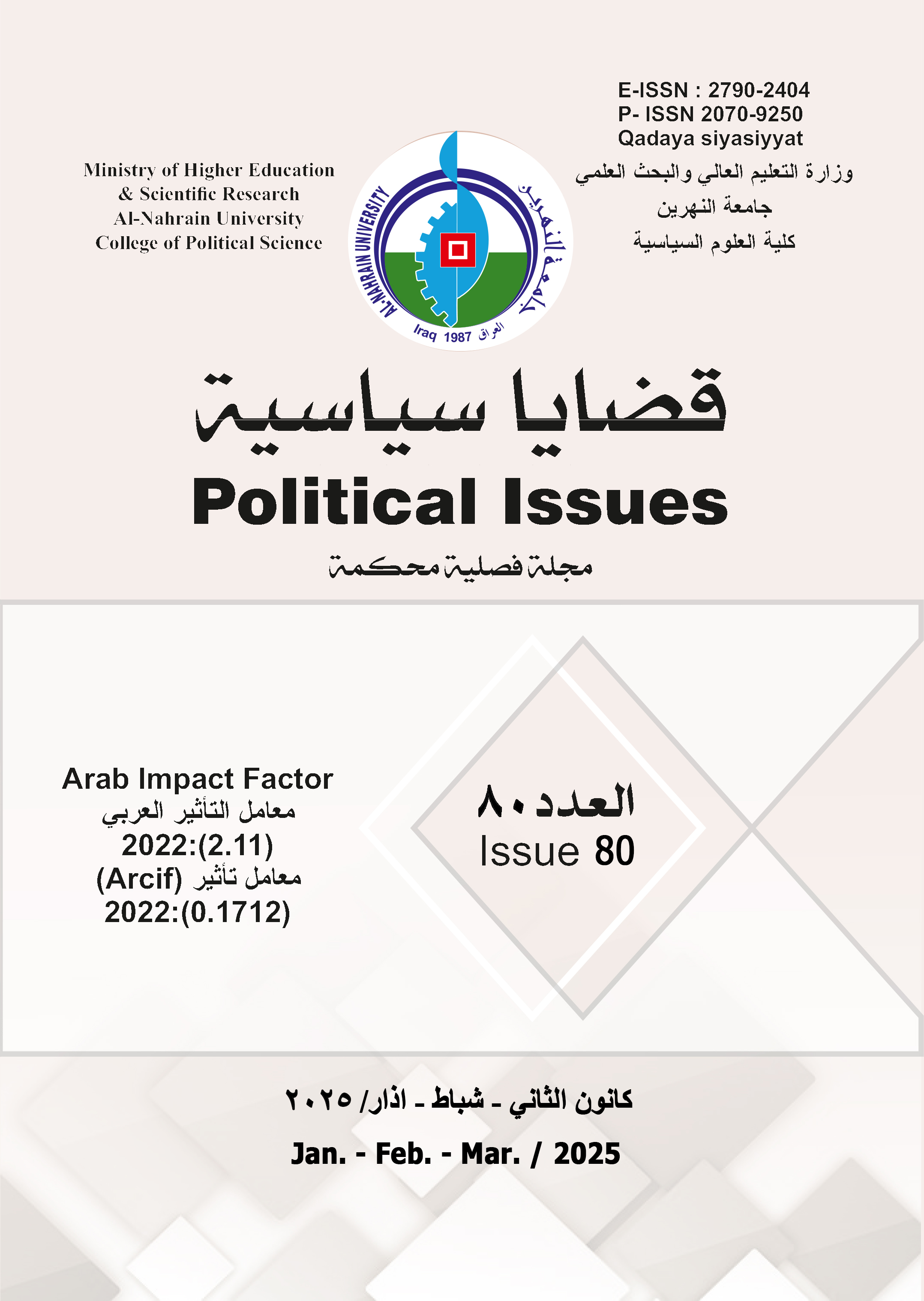Demographic Variable and State Power: A Study of the Content of Reciprocal Effect (China - India as a Model)
DOI:
https://doi.org/10.58298/802025673Keywords:
population, state power, impact, population growth, calculating state powerAbstract
Those who invoke the demographic variable to seek state power in terms of quantitative increase or decrease are not mistaken, as it is an important approach to tracking the state's structural imbalances, a measure of the effectiveness of public policies, and a microscopic examination of its strategic performance, particularly in employing the complex situation that results from demographic strength. Sometimes it is a source of strengthening the state's power in various paths of power (economic, military, cognitive), and at other times it represents a point of weakness that increases the state's burdens due to the increase in population numbers, coupled with the authorities' inability to find measures to contain it in a manner that achieves development and progress. Many theorists of calculating state power have focused on the population element and its connection to the concept of state power, which is reflected in the reciprocal impact on state power. This is due to the differences like the demographic variable, its size, and the adequacy of resources to sustain it. In the context of tracking population power and its impact on state power, there are two models. The first is China, which has been able to make population growth an additional element of state power while remaining wary of the dangers of population growth. The second is India, where population growth is one of the determinants of increasing state power.
References
Arkan Mahmoud Ahmed Aswad Al-Khatuni, China's Role in Security Arrangements in the Asia-Pacific Region, 1st ed., Dar Al-Akademoon for Publishing and Distribution, Amman, 2021.
Graeme Heard, Great Powers and Strategic Stability in the Twenty-First Century: Competing Visions of the Global Order, 1st ed., Emirates Center for Strategic Studies and Research, Abu Dhabi, 2013.
Jamal Khaled Al-Fadi, Change in the Turkish Political System - and Its Impact on the Regional Role in the Middle East, 1st ed., Dar Al-Khaleej, Amman, 2019.
Jamal Ali Zahran, Measuring State Power, Al-Mustaqbal Al-Arabi Magazine, 1st ed., Center for Arab Unity Studies, Beirut, 2006.
Soran Ismail Abdullah Bandian, The Role of Smart Power in International Crisis Management, 1st ed., Academics for Publishing and Distribution, Amman, 2020.
Saif Al-Harmazi, Approaches to American Smart Power as a Mechanism of International Change: The United States as a Model, 1st ed., Arab Center for Research and Policy Studies, Beirut, 2016.
Abdul Salam Jumaa Zaqoud, International Relations in a New World Order, 1st ed., Zahran Publishing House, Amman, 2012.
Abdul Qader Muhammad Fahmi, Introduction to Strategic Studies, 2nd ed., Dar Al-Sanhouri, Baghdad, 2006.
Firas Abbas Fadhel Al-Bayati, Population Explosion and Societal Challenges, 1st ed., Ghaidaa Printing and Publishing House, Amman, 2010.
Louis Henry, Demography: Analysis and Models, translated by Mada Sharqi, 1st ed., Arab Center for Research and Policy Studies, Beirut, 2019.
Muhammad Azhar Saeed Al-Samak, Geographical Research Methods from a Contemporary Perspective: Between the General Method and Sub-Disciplinary Methods, Al-Yazouri Scientific Publishing and Distribution House, Amman, 2020.
Mahmoud Noman Al-Fatafta, Indian Foreign Policy Towards the Palestinian Issue (1947-2005), 1st ed., Al-Jundi Publishing and Distribution House, Cairo, 2012.
Noam Chomsky, The Instinct for Freedom: Essays on Philosophy, Anarchism, and Human Nature, translated by Mu'ayyad Nashar, 1st ed., Mamdouh Adwan Publishing and Distribution House, Sharjah, 2017.
Hadeel Abdul Mawla Tashtoush, National Security and Elements of State Power in the New World Order, 1st ed., Hamed Publishing House, Amman, 2012.
Walid Abdul Hay, Future Studies in International Relations: Applied Models, 1st ed., Al-Zaytouna Center for Studies and Consultations, Beirut, 2023.
Yassin Sweid, The Foreign Military Presence in the Gulf: Reality and Options: A Call for Arab-Islamic Security In the Gulf, 1st ed., Center for Arab Unity Studies, Beirut, 2004.
Anmar Ali Ibrahim, The Global Strategic Balance (A Study of the Differential Power Thesis), unpublished doctoral dissertation, College of Political Science, Al-Nahrain University, Department of Strategy, 2022.
Additional Files
Published
Issue
Section
License
Copyright (c) 2025 انمار علي ابراهيم

This work is licensed under a Creative Commons Attribution 4.0 International License.
This is an Open Access article distributed under the terms of the creative commons attribution (CC BY) 4.0 international license which permits unrestricted use, distribution, and reproduction in any medium or format, and to alter, transform, or build upon the material, including for commercial use, providing the original author is credited.






